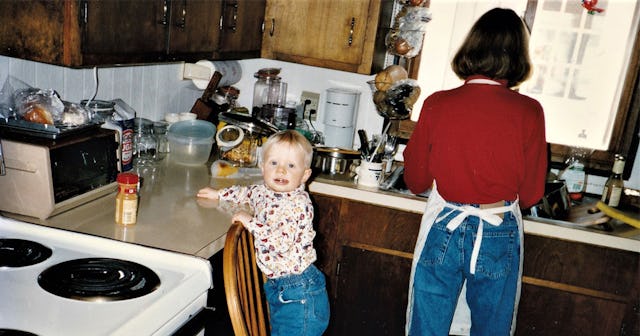What I Realized When I Watched My Grown Son Cook Dinner

“Lay the blade sideways, then press down hard and the skin comes right off. Or smash your hand down, if you’re into theatrics,” I say with a laugh. I watch as my son struggles to peel each tiny piece of skin off a garlic clove and then begrudgingly, he turns to the cutting board to try my method.
I cannot think of a time that I have ever sat still in my kitchen. A recent foot surgery has left me in a cast with my “toes above the nose” for two weeks. My son, Sam, is preparing his favorite—salmon with jasmine rice and sautéed green beans—and I watch as he carefully minces garlic. I’m amazed he knows how to cook and that he’s old enough to do so. Wasn’t it just yesterday that I installed childproof safety knobs on the stove to prevent him from burning his tiny hands? And when did I grow old enough to muse “wasn’t it just yesterday…”?
Dinner has always been a special time for my family and home-cooked meals provided the glue that held my kids and I together during the upheaval of my divorce from their father. Amidst the chaos, dinnertime was an aspect of our lives that remained unchanged. Of my three children, Sam has always been the least resistant to change and, fittingly, the keeper of family traditions. He finds comfort in ritual. When their father left, his spot at the head of our dinner table remained unoccupied and we all kept our same places. Even when Sam grew larger than the rest of us—much too large to squeeze into his chair sandwiched between the table and the window—he stayed in his same spot.
For him, and really for all of us, dinnertime was a time to connect as a family. No TV or cellphones were allowed, grace was always said. As my children grew older, they arrived at different times throughout the evening, after practice or work, but a meal was always waiting. Cooking for them was my way of keeping us together, of showing them love.
The kitchen was my stage. For years, I weighed in on the issue du jour, my back to my audience as I worked at the stove or sink. My kids sat at the kitchen table, eating snacks, studying, describing their days. Years passed and conversations evolved from playground squabbles to sexting. I remember trying not to react to a story about a friend who was “cutting” or another who might be pregnant.
Now I sit in a recliner, a bystander in this same kitchen, casted foot in the air, watching my son’s back as he cooks, following along as he talks. I realize how much better I listen when I’m sitting, not doing. I notice more. When they were growing up, I was always too busy, too tired, too stressed, too fill-in-the-blank, to notice how special these moments were and how fleeting.
Courtesy of Julie Christmas
Sam describes his internship search, his worry about finding a paying position while he applies to medical school. He chops green beans and we converse quietly, casually, about any topic that comes up. I point to his meal prep and joke that he will make a good husband someday and we discuss an ex-girlfriend. We talk about his upcoming MCATs and we both wonder how he will ever find time to cook for himself once he starts medical school.
He concentrates on adding almonds to the green beans, locating olive oil to splash into the pan. I watch and remember him mixing cake batter with me when he was little. I pulled a chair to the countertop and handed him the eggs to crack—his favorite part besides licking the mixing spoon. He stirred the eggs into the flour while I worked next to him. Now, he looks back over his shoulder and smiles at something I say and it’s that same cake-batter boy, helping his mom.
I watch him expertly measure out water for rice and check the oven. Did he learn that from me? I wonder what else he picked up. Did he appreciate my continual presence in that kitchen for what it truly was—a commitment to be present for them, a promise to be there? I wonder if I raised a boy who will become a man who shares laundry and chores and childcare with his wife. And I realize that a young man who cooks for his mother after surgery probably will.
Dinner is excellent. He admits he needs more recipes and eyes the growing sink full of dishes, dreading the cleanup ahead. He doesn’t say so, but I know he remembers all the meals I cooked for him, how many times I cleaned the kitchen solo so he and his older brother and younger sister could begin homework. “Wow, these dishes really pile up,” he says with a sigh, as he turns to his task.
I settle back in my chair and enjoy the scene as it plays out before me. I understand now that our years spent together in my kitchen meant so much more than the daily acts of cooking and eating and cleaning. These hours together were life lessons about how to give, how to care, how to love.
This article was originally published on